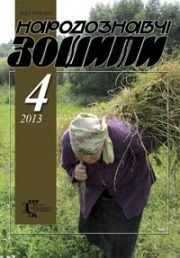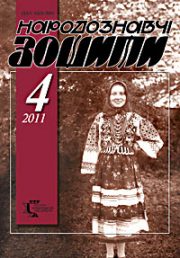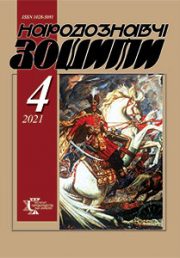The Ethnology Notebooks. 2020. № 3 (153), 563—572
UDK [398.21:179.6.035.3(477)”19/20″](092)
DOI https://doi.org/10.15407/nz2020.03.563
FOLK RETELLING «SHUKHEVYCH KILLS ENEMIES AND HEROICALLY DIES»: IDEOLOGICAL AND SEMANTIC ASPECT
LUNIO Eugene
ORCID ID: https://orcid.org/0000-0002-1543-7008
Candidate of Philology,
Institute of Ethnology
National Academy of Sciences of Ukraine,
Research Fellow, Department of Folklore,
15, Svobody ave., 79000, Lviv, Ukraine,
Contacts: e-mail: lunyoe@gmail.com
Abstract. Formulation of the problem. National-epic images of heroic persons who in the past have sacrificed themselves to fight against external enemies — oppressors of Ukraine, have important potential for the development national identity of its modern citizens, both the masses and the elite. One of the most famous Ukrainian national heroes of the last century — the Chief Commander of UPA Roman Shukhevych — «Taras Chuprynaka» is a character of many folklore works that are still prevalent active in the present. Previously, only G. Demian was engaged in recording and analyzing narrative folklore about R. Shukhevych, and the author, in a number of articles.
The purpose of the article is based on the analysis of the original folk legend «Shukhevych kills enemies and heroically dies» — to trace his genesis and development dynamics, highlight the subjective component in the work — the author’s artistic fiction, and the component is objective as a direct reflection of historical reality, to illuminate their organic unity as an artistic phenomenon. To point out the special ideological, political and aesthetic role of R. Shukhevych as a historical figure and as an artistic image in the formation of the Ukrainian mass consciousness. The methodological basis is a method of hermeneutics, which is defined as an art of understanding of textual discourse, and also defines as a commentary and interpretation of an artistic work by way of a rational-analytical and intuitive comprehension of its artistic meaning. The object of the study of this article is the original folk legend on the motive: «Shukhevych kills enemies and heroically dies». The subject of the study is the ideological and semantic aspect of the national-epic image of the UPA Commander-in-Chief. Novelty — the author first discovered and explored the latest modern phenomenon inherent in insurgent prose — the tendency of a certain confrontation between epic — oral and book — written forms of interpretation of reality.
Keywords: insurgent heroic epic, folk story, folk retelling, national hero, R. Shukhevych, OUN, UPA, Yavorivshchyna.
Received 19.05.2020
REFERENCES
Demian, G. (1998). Ukrainian people about General Roman Shukhevych — «Taras Chuprynka». Liberation Way (Vol. 3 (600), pp. 259—271; Vol. 4 (601), pp. 391—400) [in Ukrainian].
Demian, G. (2003). General UPA Oleksa Gasin-«Lytsar». Lviv: The Enhnology Institute of the National Academy of Sciences of Ukraine [in Ukrainian].
Demian, Gregory. (Ed.). (2006). Stepan Bandera and his family in folk songs, retellings and memoirs. Lviv: Afisha [in Ukrainian].
Lunio, E. (2007). The personality of Roman Shukhevich in the narrative folklore of Yavorivshchyna district. Ukrainian liberation movement (Vol. 10, pp. 203—224). Center for Studies in the Liberation Movement; Ivan Krypiakevych Institute of Ukrainian Studies National Acadamy of Sciences of Ukraine. Lviv: Ms [in Ukrainian].
Lunio, E. (2011). UPA Chief Commander Roman Shukhevych in folklore prose of Yavorivshchyna district. The Ethnology Notebooks, 1, 43—65 [in Ukrainian].
Lunio, E., Ilnytsky, V., Futala, V., & Galiev, M. (Eds.). (2017). The folk story «Roman Shukhevych is in a secret insurgent’s hideout»: an ideo-artistic aspect. Eastern European Historical Bulletin (Special issue II, pp. 175—185). Drohobych: Posvit [in Ukrainian].
Lunio, E. (2017). Folk retelling «Roman Shukhevych and Osip Dyakov are staying in a peasant house»: an ideological and semantic aspect. Ukraine: Cultural Heritage, National Identity, Statehood (Vol. 30, pp. 229—235). National Acadamy of Sciences of Ukraine; Ivan Krypiakevych Institute of Ukrainian Studies. Lviv [in Ukrainian].
Lunio, E. (2019). Folk retelling «Roman Shukhevych arrives in the forest to the insurgents», ideas-semantik and aesthetic aspect. The Ethnology Notebooks, 4, 906—914 [in Ukrainian].
Vinquist. Ch., & Taylor, V. (Eds.). (2003). Encyclopedia of Postmodernism. Kyiv: Fundamentals [in Ukrainian].
Borev, Y. (1988). Aesthetics (Ed. 4th, add). Moscow: Political Literature Publishing House [in Russian].
Sudoplatov, P. (1996). Intelligence and the Kremlin. (Notes from an unwanted witness): Declassified lives. Moscow: Geya LLP. Retrieved from: www.rulit.me › books › razvedka-i-kreml-za… [in Russian].
Lunio, E. (2018). Folk retelling «Yuri Shukhevych recognizes to his deceased father»: ideological and artistic aspect. Mythology and folklore, 3—4, 5—13 [in Ukrainian].
Lunio, Eugene (Ed.). (2005). Yavorivshchyna region in the insurgent struggle. Stories of participants and eyewitnesses (Vol. 1): Nakoneczne First. Nakoneczne Second. Lviv: Chronicle [in Ukrainian].
Cook, V. (2007). UPA Commander-in-Chief general-hоrunji Roman Shukhevych. Chronicle of the Ukrainian Insurgent Army (Vol. 45, pp. 470—490). Toront; Lviv: UPA Chronicle Publishing House [in Ukrainian].






